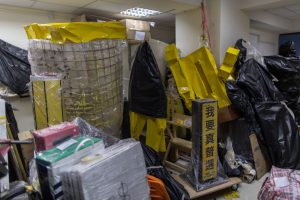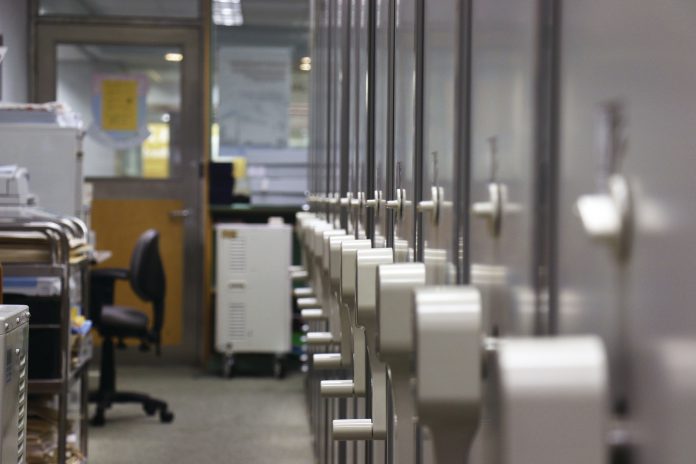Lack of archives law creates holes in historical records and gaps in government accountability
By Jade Li and Jasper Cao
On the nights before the police clearances of the occupied sites in Admiralty, Mongkok and Causeway Bay in 2014, volunteers raced to save the paintings, slogans, sculptures, banners and other “objects of demonstration” of the Umbrella Movement. This followed weeks of careful inventory making. After collecting the artefacts, the volunteers sent a number of them to the University Library of the Chinese University of Hong Kong for safe-keeping.

Sampson Wong Yu-hin, the founder of the Umbrella Movement Visual Archives and Research Collective, one of the groups involved in the rescue, says the activists were hesitant to send the objects to museums because they were worried that the administration may try to hide or eradicate the historical record.
“We trust the library because we think institutions doing academic research uphold integrity, unlike museums which are more manipulated by the government,” explains Wong.
While artists and cultural workers were concerned about the need to preserve and record the cultural artefacts from the movement, others drew attention to the need to have a record of the government’s decision-making process during Hong Kong’s most significant political movement in recent decades.
As Hong Kong does not have an archives law, the government is not obliged to preserve and maintain records. However, the then Chief Secretary Carrie Lam told legislators last year that, “the essential principles of records management adopted internationally have been implemented through administrative arrangements.”
Simon Chu Fook-keung, a former director of the Government Records Service (GRS), is not convinced. Chu, who helped found the Archives Action Group, has been campaigning for the enactment of an archives law for years.
Chu says that without legal constraints, the government can falsely claim that they do not have records. He cites the recent example of the “soft lobbying” for the controversial Wang Chau housing plan in which officials said there were no records of certain meetings.
For Chu, records should be widely defined to mean anything related to official duties that may be of archival value. This means they can be in any media format and are not restricted to paper documents and minutes of meetings. He thinks that under an archives law, communications by email or messaging applications such as Whatsapp and Telegram should also be preserved.
He raises the example of Education Secretary Eddie Ng Hak-kim, who sat in his car for 45 minutes after refusing to speak with protesters following a visit to a school in March last year. When Ng was criticised for “playing with his phone”, he said he had been discussing work matters with colleagues. Chu says electronic records would reveal the truth, but under the current situation we may never know because the government fails at the first step of record keeping, which is to create files for keeping.
Chu adds the rapid advances in technology present an extra challenge to official record keeping as the government does not have an up-to-date system for managing electronic documents. He says many of the departments still use a print-and-save method to store data and records.
Meanwhile, action to enact an archives law has been slow. In November 2011, then lawmaker Margaret Ng Ngoi-yee tried to move a motion on enacting an archives law in the Legislative Council but failed. The Law Reform Commission formed a subcommittee in 2013 to conduct studies on an archives law but there has been little progress.










































